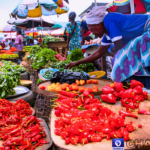Exporters and stakeholders have expressed concern over the difficult economic conditions in Africa, stating that transportation and regulatory restrictions make exporting to other countries, even though the region is close, more difficult.
According to the National Bureau of Statistics’ Q3 2024 trade report, Nigeria’s exports to Africa accounted for only 12.13% (N2,486 tonnes) of total exports, falling below Europe’s (9.13%) by 0.18 tonnes or 25.31%.
Meanwhile, exports to ECOWAS countries, including Ivory Coast (N662.71 billion), South Africa (N621.68 billion) and Togo (N574.93 billion), cost N1.54 trillion. Spain (N2.27 tonnes) is the largest export destination, accounting for 11.07% of total exports.
The top exporting countries outside Africa include the United States (1.67 trillion or 8.25%), France (1.59 trillion or 7.75%), the Netherlands (1.43 trillion or 7%) and Italy (1.37 tonnes or 7.75%).
- Advertisement -
According to the National Bureau of Statistics, “five (non-African) countries accounted for 40.79% of all exports in the third quarter of 2024, compared to 12.13% for the continent.”
The exporters, especially small and medium-sized enterprises, said that despite the creation of the African Continental Free Trade Area, the African country’s trade is still low compared to other countries, causing many problems.
Bosun Solarin, CEO of Dasun Integrated Farms Limited, is concerned about the logistical challenges plaguing intra-African markets. “You can ship to Europe or America cheaper than to other countries in Africa,” he said. “I had a cargo to Liverpool, England in 24 hours, but it will take seven working days to Ghana.”
The high costs and delays at the border are frustrating.
Solarin also described his journey from Dhaka to Lagos, noting poor procedures and slow border crossings. “The truck is a pain as it goes from Senegal to Mali and then to Ivory Coast, but the risks and disadvantages often outweigh the benefits,” he said.
- Advertisement -
SMEs are unable to export many products to African countries because the market outlook shows that most of the products do not represent the products that are traded more by small businesses and exporters.










